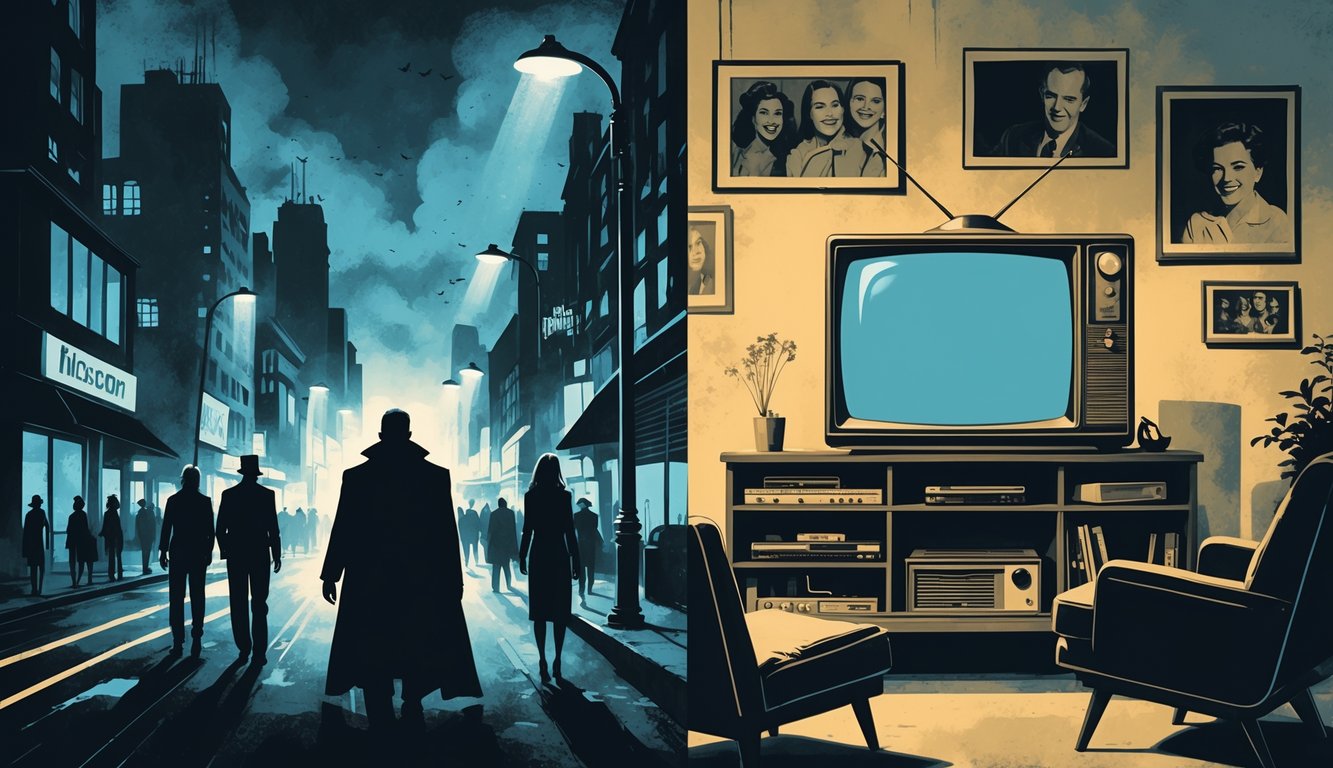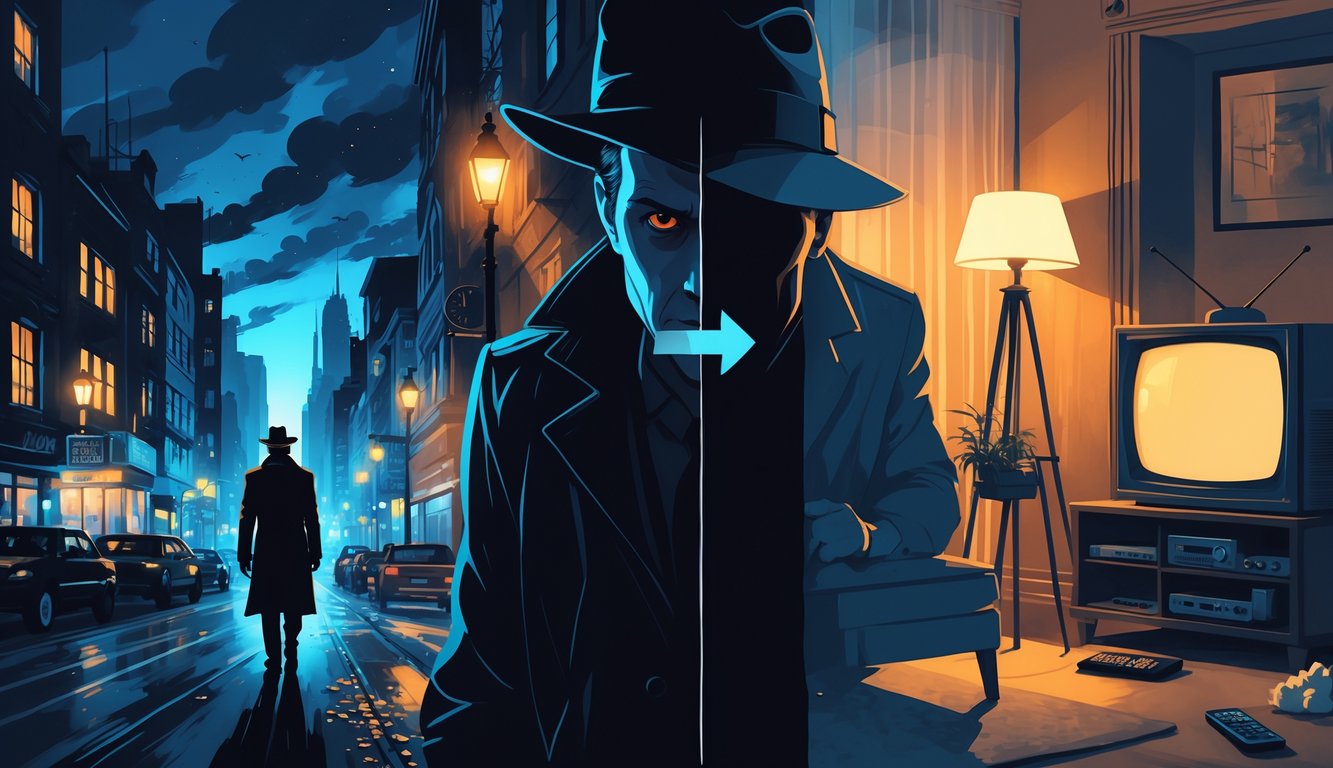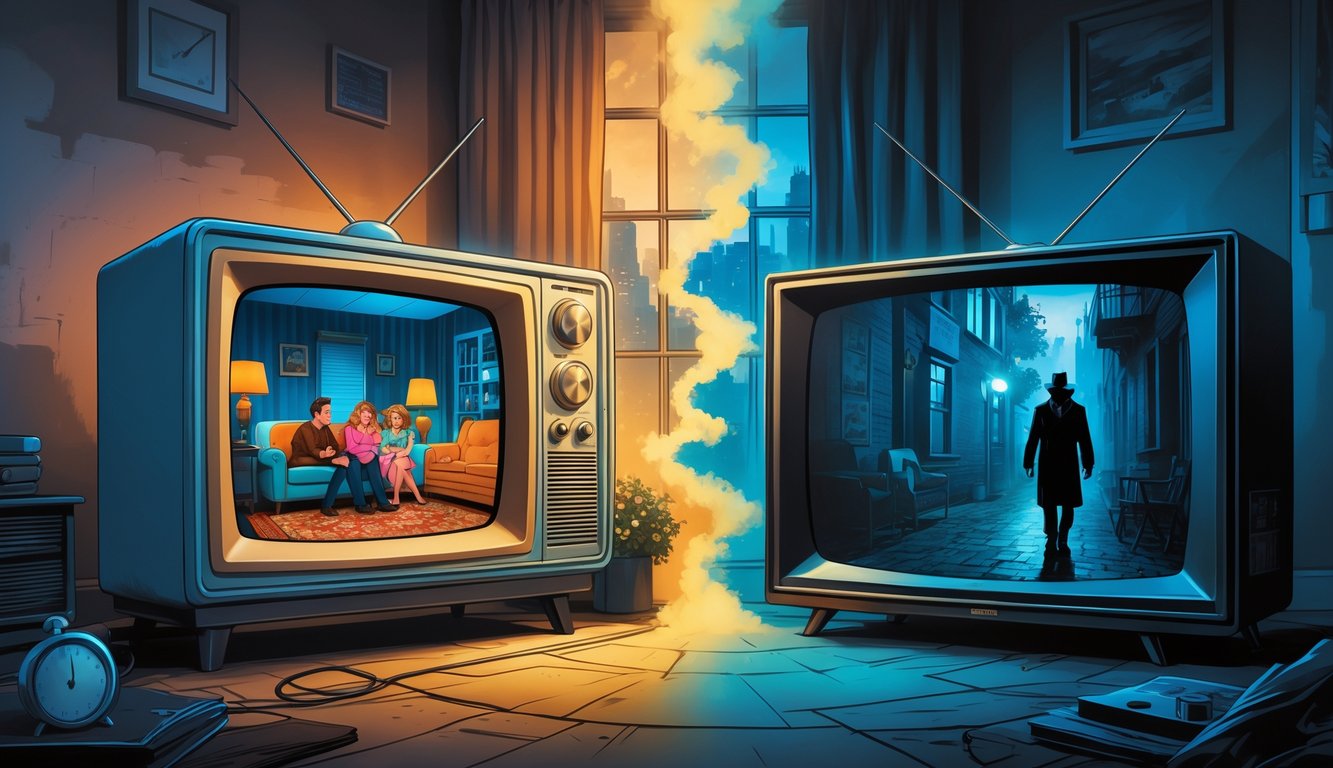
Every time I open Netflix—there it is, another endless parade of moody crime shows, murder mysteries, and “limited series” with names like “The Night Is Watching” or whatever. Sitcoms? I mean, where’d they go? Feels like they vanished faster than my willpower at 2am. I’m not hallucinating this—back in the ‘90s, sitcoms were everywhere. Now, they’re a blip. I saw some chart somewhere (yeah, this one) and almost choked on my coffee—sitcoms were, what, 10% of new shows back then? Now it’s, like, a rounding error. And yet, everyone acts like limited series are the only thing anyone talks about at work. Who even decided that? Is there a committee? Anyway, apparently the numbers back it up, and honestly, I wish I could unsee those stats sometimes. (Here’s more genre data if you’re a masochist.)
Everything’s shifted. Thrillers and crime dramas are bulldozing their way onto every homepage, squeezing out the old laugh-track sitcoms. Suddenly, I’m googling plot recaps after every episode, and sitcoms feel like relics—like those VHS tapes you find in a box labeled “miscellaneous” after a move. People still text me Seinfeld punchlines, but when we actually watch something together, it’s always some brooding hacker, a missing person, or a “shocking twist.”
Am I the only one who remembers when “comfort TV” actually meant comfort? Feels like now, relaxing means lining up six hours of psychological mayhem and guessing which character’s a sociopath. The laugh tracks just sit there, gathering digital cobwebs. Not even nostalgia—more like, “wait, how did we end up here?” Stats and algorithms drag us toward the next anxiety-inducing binge, and sitcoms just… fade.
Understanding the Thriller Genre’s Growing Popularity

Jump cuts everywhere. No one’s got patience for slow setup scenes—blink and suddenly someone’s running from a shadow, and I’m still trying to untangle my headphones. Thriller, mystery, true crime—these things are everywhere. The entertainment industry’s market value is ballooning (or so they keep telling me), while sitcom reruns just sort of… sit there. Nobody warned me I’d end up addicted to cliffhangers that actively sabotage my sleep.
Defining Modern Thriller Elements
Why does every thriller now have, like, three unreliable narrators? My brain hates it, but I keep watching. Pacing isn’t optional anymore. If a show doesn’t give you whiplash in the first ten minutes, the internet declares it “boring” and moves on. I have this friend who directs stuff (can’t park, but whatever)—he once showed me his storyboards, all built for viewers who might bail if the plot doesn’t spike every five minutes.
And yeah, mobile habits are real. If something doesn’t grab you, you’re watching a dog video instead. No one says this out loud, but modern thrillers on streaming platforms pile on so much irony, psychology, and meta-commentary that I half expect to need a whiteboard just to keep track. Moral ambiguity, characters who betray themselves, relentless unpredictability—sometimes I pick a show and end up reading Reddit threads for an hour instead of just watching.
Thriller’s Appeal to Contemporary Audiences
People say sitcoms are “comforting,” but let’s be honest, thrillers are what everyone gossips about at lunch. Even the people who claim they “only watch documentaries” are binging the latest murder mystery. Limited series, especially, are like catnip—they promise closure, then drop a last-minute twist and leave you yelling at your screen. I think Nielsen said thrillers are, what, 20% of audio and a third of ebook sales in the UK? (Don’t quote me on the month. Spring, maybe? I don’t know.)
The emotional payoff is, like, engineered. I’m not even kidding—there are teams measuring heart rates and sweaty palms to figure out which scenes make us keep watching. Sometimes I wish I was making this up. Even my neighbor who never reads finished that new Scandinavian thriller in one night. Apparently, we all want a safe dose of danger, adrenaline, and fake peril—while lying on the couch in pajamas.
Evolution from Classic to Modern Thrillers
People always name-drop Hitchcock but—let’s be real—modern thrillers are nothing like “Psycho.” It’s like comparing a rotary phone to an iPhone. I saw a market forecast that said the global thriller film market hit $18.5 billion in 2023 and might hit $32.1 billion by 2032. That’s not because of movie theaters. Streaming’s the culprit.
Limited series are everywhere—one season, no filler, relentless hype. The genre keeps mutating: sometimes sci-fi, sometimes police drama, sometimes true crime. And somewhere in there, sitcoms just faded out. Not because we stopped liking jokes, but because tension and plot twists took over. That’s where the money and the arguments about “who did it” live now.
The Decline of Classic Sitcoms

Nobody told me sitcoms would start feeling so… weird. Like, laugh tracks now sound fake, almost dystopian. The roots of TV comedy are still there, kind of, but now they’re retro—like a tube TV in a showroom full of OLEDs.
Changing Preferences Among Viewers
Every time I open a streaming app, it’s a parade of thrillers and docuseries. Sitcom reruns are there, but I skip them for something darker. Audience taste? Totally different. Some Spectator News article (2024, I think) said digital platforms reward short, punchy arcs. People used to love that “reset button” formula—now, not so much. Everyone wants evolving characters and stories that actually go somewhere.
Last fall, I talked to a showrunner who tried to pitch a six-season sitcom. She just laughed and said execs get nostalgic, but nobody’s risking money on “another Friends.” Cliffhangers, even in comedies, are what get greenlit. Just check the streaming charts—how many real sitcoms do you even see up there?
Classic sitcom moments still trend on social—Ross’s leather pants, Soup Nazi, whatever—but that doesn’t mean people want 22 new episodes every year. Attention spans are toast. The sitcom can’t compete.
Factors Leading to Reduced Sitcom Popularity
Is it just me, or do sitcom plots about job mishaps and awkward dates feel less universal now that everything’s an algorithm? Writers and producers are bailing for those 8-10 episode dramas. They’ll tell anyone who’ll listen that sitcoms lose viewers too fast. The Mancunion broke it down—limited series like “Big Little Lies” or “The Queen’s Gambit” are sucking up all the talent.
I keep this spreadsheet (don’t judge) tracking renewal rates. Traditional sitcoms? Dropping like flies compared to dramas and “dramedies.” I’ve asked a few studio execs off the record—they blame ad dollars moving to shows with longer engagement. Sitcoms were built for syndication, but now they can’t keep up with the binge model. Plus, reality TV and true crime are eating their lunch.
Trying to sell multicam sitcoms with laugh tracks to Gen Z? It’s like recommending MySpace to someone who’s never heard of Facebook. Just awkward.
Sitcoms in the Age of Streaming
Now it’s all algorithmic. I get pitched more Norwegian thrillers than new sitcoms. Binge culture rewards shows you can’t just drop in and out of—standalone sitcoms don’t stand a chance. I asked a Netflix analyst about sitcoms coming back; she shrugged and muttered something about “international tastes.” Translation: don’t hold your breath.
Even when a platform revives a sitcom—“Fuller House,” “The Ranch”—it’s a short run, always with a wink about how dated it is. Streaming makes the old stuff immortal, but also kind of buries it. I’ll binge “The Office,” then notice six new comedies buried way down the list.
Sitcoms aren’t “evolving” so much as gasping for air in a market obsessed with twists and tension. The formula’s frozen in time, but right now, even if laughter’s timeless, we’re all swiping for adrenaline and murder instead.



